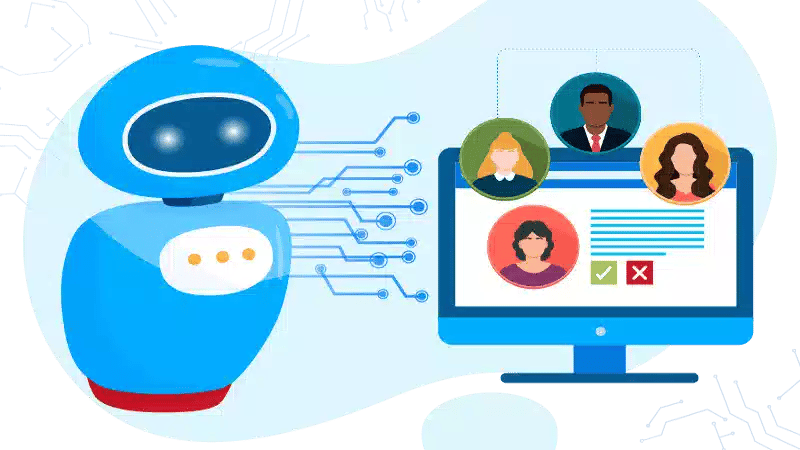The Impact of AI on Employer Branding and Recruitment
In today's job market, it's crucial to prioritize employer branding and recruitment. As companies seek to attract top talent and candidates search for their ideal employer, optimizing these processes is key to building a successful team. However, with the rise of Artificial Intelligence (AI), these components are undergoing a significant transformation.
AI has thrown employer branding and recruitment on its axis, accelerating and streamlining these processes. If your business wants to continue to optimize recruitment processes, here's what you need to know about AI.
Why Does it Matter?
-
86% of job seekers research company reviews and ratings before applying. Job seekers are constantly on the hunt for companies that align with their values and provide a positive work environment. A strong employer brand can effectively communicate a company's culture, values, and benefits to potential candidates, making them more likely to apply for open positions.
-
75% of active job seekers are likely to apply for a job if the employer actively manages its employer brand. Employer branding is a critical investment for companies that desire to attract and retain top talent. It encompasses more than just creating a website or a few social media posts. Instead, it involves providing job seekers with a consistent and positive experience throughout the hiring process.
-
50% of candidates say they wouldn't work for a company with a bad reputation, even for a pay increase. A company's negative employer brand can seriously impact its ability to attract and retain top talent. This can be attributed to factors such as poor employee morale, high turnover, or negative media coverage. Not only does a negative brand make it harder to find qualified candidates, but it also means that companies may have to offer higher salaries to attract and retain employees.
-
92% of people would consider changing jobs if offered a role with a company with an excellent corporate reputation. Investing in a strong employer brand can pay off in more ways than one, including improved employee retention. When employees are proud to work for their company, they are more likely to stay loyal, even when offered higher salaries by other companies. Creating a strong employer brand involves investing in employee development, offering competitive benefits, and cultivating a positive work environment that fosters growth and collaboration.
-
A strong employer brand can reduce the cost per hire by as much as 50%. Investing in a strong employer brand not only attracts top talent but also reduces the cost per hire. This cost includes recruiting, hiring, and onboarding expenses. By creating a compelling employer brand, companies can attract qualified candidates faster, significantly reducing the time and cost of filling open positions.
Employer branding and recruitment are two important aspects of human resources. By investing in employer branding, companies can attract top talent, improve employee retention, and save money in the long run.
Employer Branding and Recruitment
Employer branding promotes a company's reputation and image to attract and retain top talent. It involves creating a unique employer value proposition (EVP) that resonates with potential candidates and showcases the company's culture, values, and benefits. Effective employer branding helps companies differentiate themselves from competitors and build a loyal and engaged workforce.
Recruitment, on the other hand, is the process of finding and hiring the right candidates for open job positions. Recruitment involves sourcing, screening, interviewing, and selecting the most suitable candidates for the job.
Both employer branding and recruitment are crucial for a company's success in today's competitive job market. To attract and retain top talent, companies must have a strong employer brand that resonates with potential candidates and a streamlined recruitment process that identifies the best candidates quickly and efficiently.
AI and Recruitment
The recruitment process has traditionally been manual and time-consuming, involving screening resumes, scheduling interviews, and making hiring decisions based on subjective judgments. However, with the advent of AI technology, the recruitment process is undergoing a significant transformation.
AI-powered tools are being used to automate and streamline various aspects of the recruitment process, from sourcing and screening candidates to conducting interviews and making hiring decisions.
Screening Resumes
Resume screening is a critical component of the recruitment process. It involves reviewing and assessing candidates' resumes and cover letters to determine whether they have the qualifications and experience for the job. However, this process can be time-consuming, and recruiters may overlook suitable candidates due to human biases.
AI-powered resume screening tools are being used to automate and streamline the resume screening process. These tools use natural language processing (NLP) algorithms to analyze resumes and cover letters and match them against job requirements. This saves recruiters time and effort in manually screening resumes and provides a more objective and accurate assessment of candidates.
Advantages of using AI in resume screening:
- Saves time and effort in manually screening resumes
- Improves the speed and efficiency of the recruitment process
- Provides a more objective and accurate assessment of candidates
- Reduces the risk of human biases in the screening process
It's important to note that there are concerns about AI resume screening tools perpetuating biases, such as gender or racial biases, as they learn from historical data. To mitigate this, companies should ensure that their AI algorithms are designed to be unbiased and regularly audited for fairness.
Conducting Interviews
Conducting interviews is another crucial component of the recruitment process. It involves assessing candidates' skills, experience, and personality to determine whether they are a good fit for the job and the company culture. However, conducting interviews can be time-consuming, and recruiters may struggle to remain objective and avoid biases.
AI-powered interview tools are being used to automate and streamline the interview process. These tools use machine learning algorithms to analyze candidates' responses to interview questions and provide insights into their skills, personality, and cultural fit. This saves recruiters time and effort in conducting interviews and provides a more objective and accurate assessment of candidates.
Benefits of using AI in interviewing:
- Saves time and effort in conducting interviews
- Provides a more objective and accurate assessment of candidates
- Reduces the risk of human biases in the interview process
- Improves the candidate experience by providing timely feedback
Despite the benefits, there are challenges in using AI for interviewing. For example, AI algorithms may not accurately assess candidates' soft skills, such as communication or teamwork skills. Additionally, candidates may feel uncomfortable interacting with a machine instead of a human interviewer, leading to a poor candidate experience.
To mitigate these challenges, companies should ensure that their AI algorithms are designed to assess hard and soft skills and provide a seamless candidate experience.
AI and Employer Branding
Employer branding refers to promoting a company as an attractive employer to current and potential employees. This includes showcasing the company's values, culture, and work environment (and personality) to attract top talent. With the increasing use of AI in recruitment, employer branding is also transforming.
Personalization
One of the significant impacts of AI on employer branding is personalization. AI-powered tools personalize the candidate experience by tailoring job recommendations and communications based on candidates' preferences and interests.
For example, AI can create targeted job ads that appeal to candidates with specific skills or interests. It can also provide personalized feedback to candidates, such as tips on improving their resumes or interview skills. By personalizing the candidate experience, companies can establish their employer brand by showing candidates that they are valued and their needs are considered.
Candidate Assessment
Another impact of AI on employer branding is candidate assessment. AI-powered tools are used to assess candidates' skills, experience, and cultural fit, providing a more objective and accurate assessment than traditional recruitment methods.
By using AI to assess candidates, companies can demonstrate their commitment to fair and unbiased hiring practices, demonstrating their employer brand in action.
Candidate Engagement
AI can also be used to enhance candidate engagement, which is a critical component of employer branding. Companies can use AI-powered chatbots to provide candidates with timely feedback and answers to their questions, improving the candidate experience and enhancing the company's employer brand.
For example, chatbots can answer candidates' questions about the recruitment process, provide feedback on their application status, and schedule interviews. This saves recruiters time and provides candidates with a seamless experience, which can enhance the company's employer brand.
Data Analytics
Finally, AI impacts employer branding by providing data analytics that can help companies optimize their recruitment processes and enhance their employer brand.
For example, companies can use AI to analyze candidate feedback and identify areas for improvement in the recruitment process. It can also be used to track the effectiveness of employer branding initiatives, such as social media campaigns, and provide insights into how to improve them.
Companies can use data analytics to optimize their recruitment tools and processes and enhance their employer brand to attract top talent and differentiate themselves from their competitors.
The Promising Future of AI
The future of AI in recruitment and employer branding is promising. With the continuous advancements in AI technology, we expect to see more innovative solutions to transform how companies attract, assess, and engage with candidates. As AI continues to build momentum, we can expect more personalization, intelligence, and automation, changing the world of recruitment and employer branding as we know it.









Leave a Comment